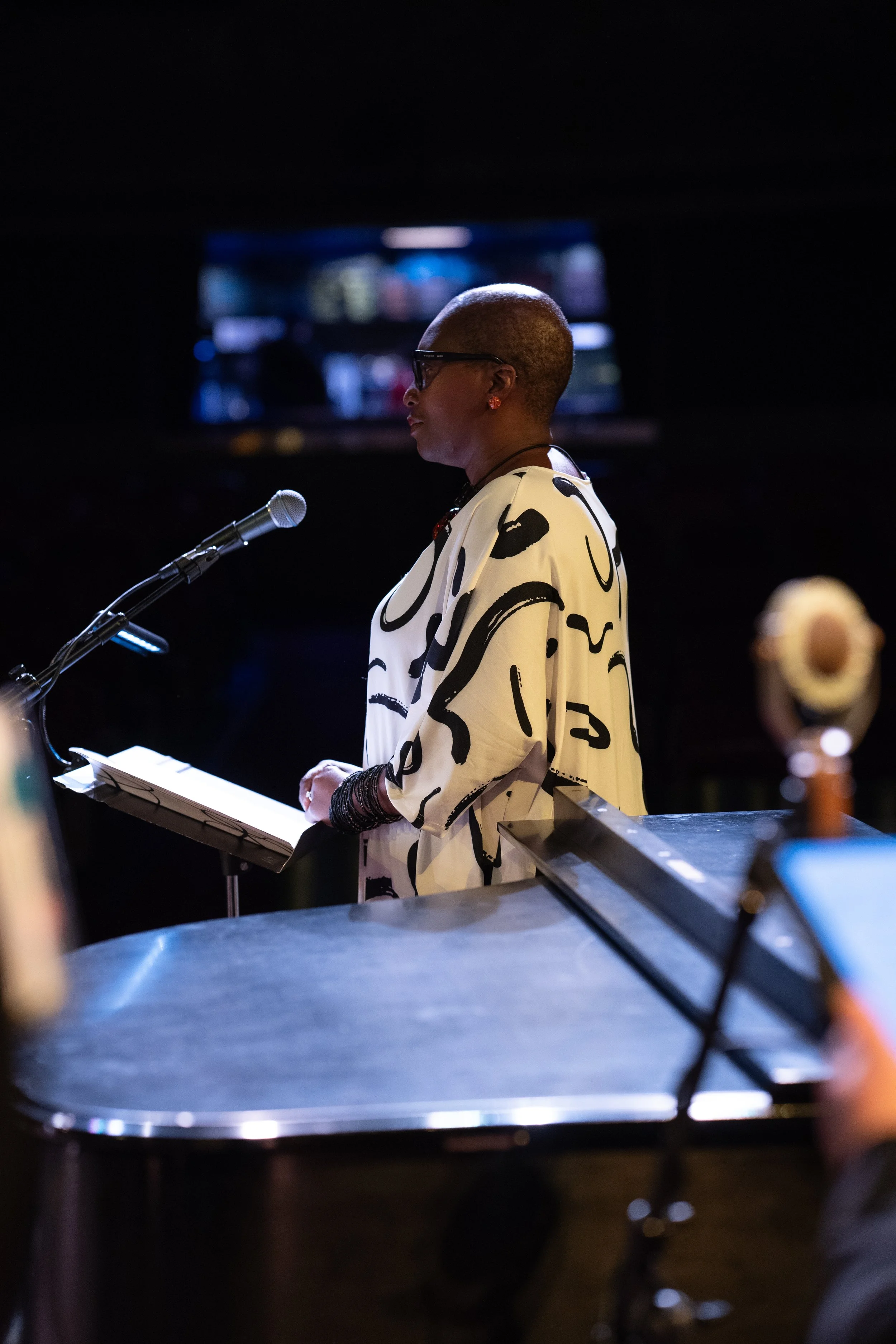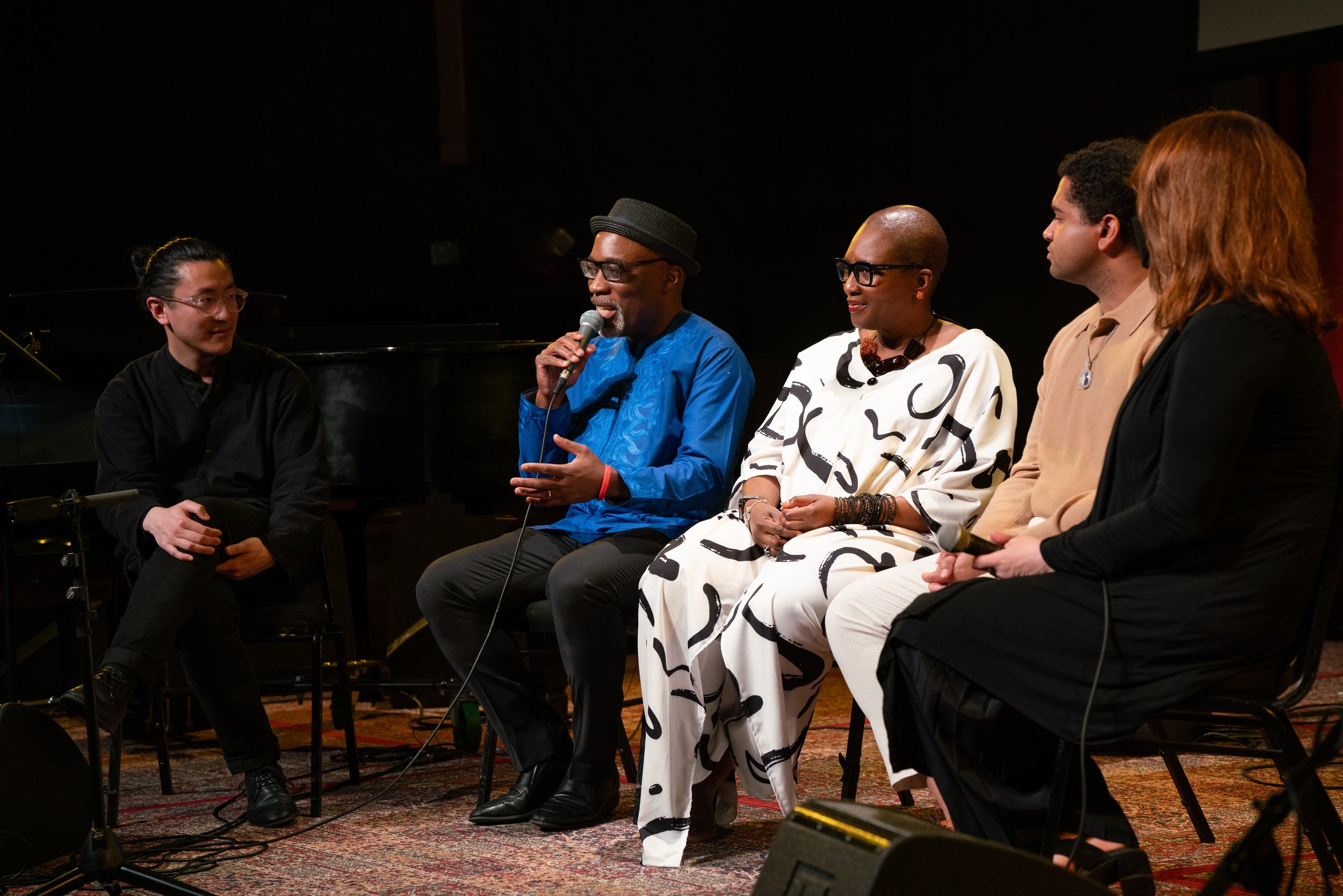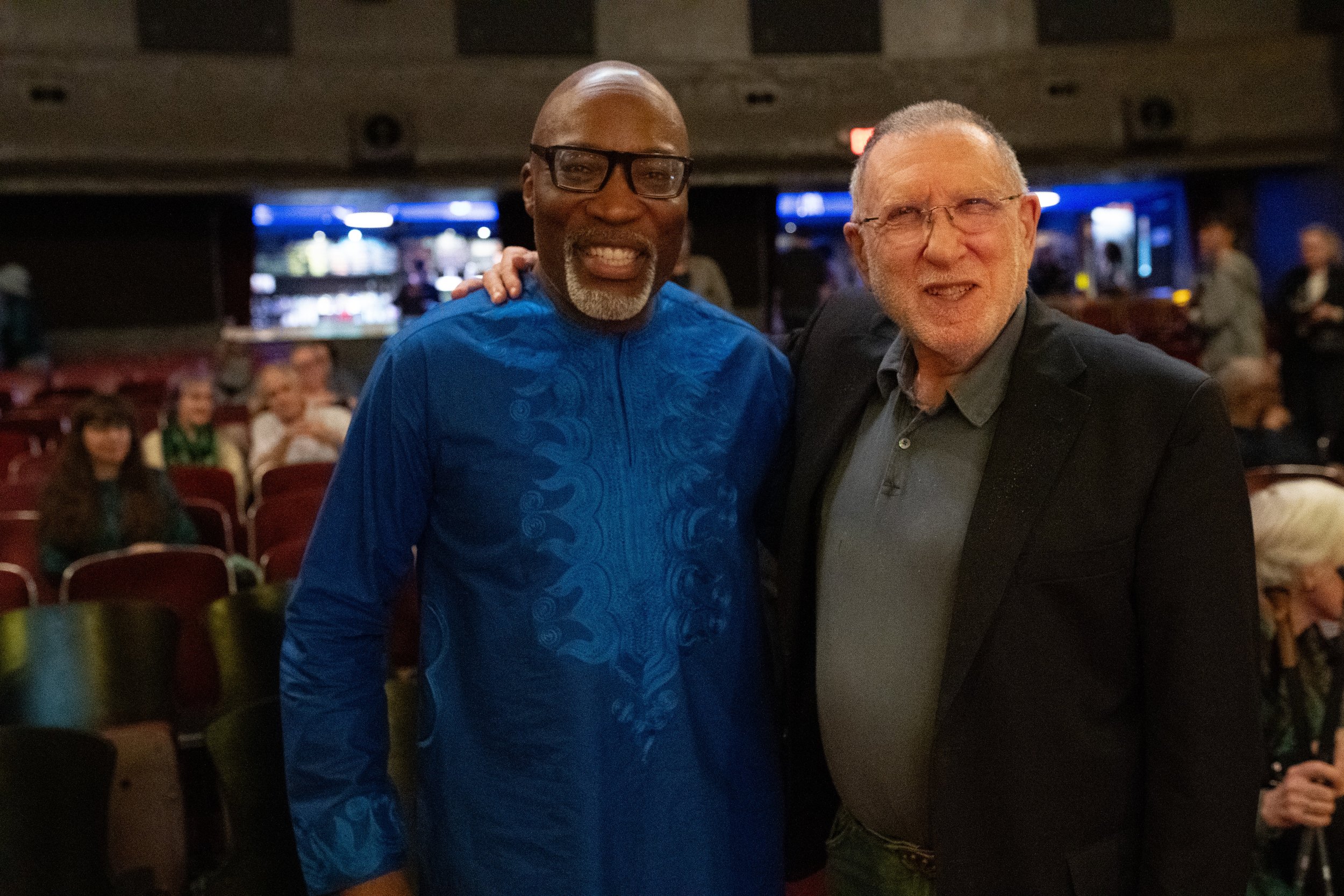Resonance Commissions | From the book of Sankofa, Pt 1: Words She Would Have Us Know
From the premiere of From the Book of Sankofa at Amendment. Video of the performance coming later this year!
Commission information
Composer: Darrell Grant
Text: A. Mimi Sei
Conductor: Shohei Kobayashi
Duration: 11’00”
Instrumentation: SSAATTBB + cello + piano + narrator
Performances:
Amendment: Righting Our Wrongs (March 17, 2024) - premiere
Commission story
In spring 2024, Resonance Ensemble presented Amendment: Righting Our Wrongs, a program featuring trailblazing composers, poets, and activists. The program’s aim was to showcase works that looked to our past to inspire a better future. Partnering with the Oregon Remembrance Project, the concert featured interwoven narratives from ORP Executive Director Taylor Stewart—sharing how stories of historical injustice can be given new endings of justice today.
The program also featured works setting texts from writer-activists like Langston Hughes and Maya Angelou, political activists like Stacey Abrams and Astrid Silva, as well as other artist-activists like Ida B. Wells, Mary Church Terrell, Zitkála-Šá, and Frances Ellen Watkins Harper.
The main event of the concert, however, was the unveiling of a new work by beloved jazz musician and composer Darrell Grant, and writer-activist A. Mimi Sei. Their new work, From the Book of Sankofa, used an original text by Mimi to honor the spirit of Sankofa.
Poet A. Mimi Sei at the premiere of From the Book of Sankofa
Darrell and Resonance Ensemble at the recording session for From the Book of Sankofa at the Hallowed Halls Recording Studio.
The day after the performance, Resonance Ensemble headed into the Hallowed Halls recording studio in Portland to record From the Book of Sankofa for an upcoming commercial release of Resonance Ensemble commissions.
Our 15th commissioning project in 15 years, From the Book of Sankofa is a welcome addition to the Resonance Ensemble repertoire—one we can’t wait to share with the world at large in the coming years.
ABOUT FROM THE BOOK OF SANKOFA, PART 1: WORDS SHE WOULD HAVE US KNOW
Common symbol for Sankofa
From The Book of Sankofa, Pt.1: Words She Would Have Us Know is a poem to the future that takes its cue from the cultural memory and ancestral wisdom that we, as Black people, carry with us from the past into the present and beyond.
Sankofa is a Twi word from the Akan tribe in Ghana that literally means to “Go back and get it.” Often represented by the symbol of a bird with its head turned backward, carrying an egg in its mouth, it represents the idea of looking back at our past to learn from it and move forward. Both the symbol and concept of Sankofa were widely used during the transatlantic slave trade as a way for enslaved Africans to connect with their heritage and culture. The idea also has a strong connection to social justice, as it encourages us to remember the struggles and triumphs of our ancestors, and to use that knowledge in our pursuit of a better future.
Musically, the piece is informed by my love of polyphony and counterpoint, as well as a jazz pianist’s desire to play with harmony. It celebrates what I believe is the transcendent magic of choral singing — the coming together of multiple voices into a powerfully unified whole, while leaving room for the individuality of expression embodied in jazz and gospel music.
Conductor Shohei Kobayashi (left), composer Darrell Grant, poet A. Mimi Sei, ORP’s Taylor Stewart, and Resonance Ensemble’s Katherine FitzGibbon at the post-concert panel for Amendment.
I was excited to collaborate in the creation of this piece with Aminata “Mimi” Radia Sei, a Sierra Leonean-American, Portland based writer and social justice advocate, whose powerful, poetic voice provides both anchor and throughline for this work.
In our early discussions about the piece, Mimi spoke of the tension between acknowledging the effects of historical trauma and oppression and the desire to reframe our narratives in order to Illuminate the treasures obscured by the pain of the past. She spoke about the idea of freedom of spirit — a freedom that isn’t weighed down by the need to address past burdens, but rather highlights the liberatory potential of BIPOC ways of seeing and being, cultural knowledge, and the rich diversity of Black experiences. Through this revelatory lens, we can rise with resilience and perseverance into the future. As the whispered instructions that introduce the piece encourage us to do, we can “Go, look, seek, take, return.”
From the premiere of From the Book of Sankofa at Amendment.
As a first step in the collaborative process, Mimi and I came up with a list of twelve words — Mission, Essence, Reflection, Progress, Reimagine, Channel, Dignity, Migrate, Reincarnate, Piety, Reverence, Stir — that could serve as inspiration for the text. These are the Words She Would Have Us Know, referred to in the piece’s subtitle. As I composed, I also found myself weaving them into the fabric of the piece itself.
It was a welcome challenge to create a narrative arc —a journey — within a single movement work. Mimi’s vivid text supplied ample fuel for a variety of musical and emotional colors. The opening words of the first stanza: “A sacred longing opens up a heart in song,” inspired both the lyrical accompaniment and the melodic impetus for the cello, whose obligato represents the flight of the Sankofa bird.
Mimi’s second stanza shifts to a darker and more somber tone that I marked “forceful and stark.” A repeated diminished progression in the piano provides underscore for the recitation, and grounds the ensemble’s resolute declarations of “a soul drenched in battle.” Stanza three starts from a place of both longing and reflection for “a sweet haven for dreams laced in song,” which, for me, evokes the soulful harmony of Negro spirituals in the US and the Mbube choral music of South Africa. The choir responds to Mimi’s final stanza with an anthemic affirmation of “unmatched prowess,” and “persistence reborn,” which lifts us into a coda that embraces the joyous rhythmic pulse at the heart of Afro-diasporic expression, until we return, strengthened and empowered, to where we began, with a prayer of benediction and gratitude.
Darrell Grant with fellow jazz legend Chuck Israels
People might rightly ask if this is a jazz piece. I would respond that, while it is informed by jazz harmonic and rhythmic language, my intention is a personal synthesis that draws on the many influences that have shaped my musicmaking. I hear echoes of Thomas Tallis, The Staple Singers, Herbie Hancock, Caroline Shaw, Franz Schubert, Bobby McFerrin, and Maurice Ravel, among others.
I hope that The Book of Sankofa, Pt.1: Words She Would Have Us Know provides listeners an opportunity to reflect on the questions of what we will pass on, what we must sacrifice, and what must we always remember in order to realize the dreams we hold for ourselves, our children and our communities.
I’m grateful to Resonance Ensemble for this opportunity, and for the commitment and consummate artistry that they bring to the endeavor of creating music that reminds us of our humanity. I dedicate this piece to my parents and grandparents, whose courage and perseverance blessed me with this life.
program note by Darrell Grant







